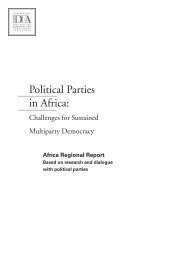Background Document - Danish Institute for Parties and Democracy
Background Document - Danish Institute for Parties and Democracy
Background Document - Danish Institute for Parties and Democracy
Create successful ePaper yourself
Turn your PDF publications into a flip-book with our unique Google optimized e-Paper software.
adolescent girls envisioned themselves as being more politically active as adults <strong>and</strong><br />
more skilled about politics than the boys, research shows that young women tend to<br />
silence their engagement <strong>and</strong> knowledge in politics.<br />
The perception that politics is a man’s world can be mitigated however if there is<br />
the presence of female role models. Role models outside <strong>and</strong> inside the family circle<br />
increase the likelihood of political activity. Additionally, if one parent is involved in a<br />
political party, it is more likely that the offspring will also be. And, last but not least,<br />
having a mother actively politically involved has a particular impact on their daughters’<br />
political involvement.<br />
Researchers of young women’s political involvement emphasise the mother role<br />
model effect <strong>and</strong> say that it is not confined to the elite level. The internal functioning<br />
<strong>and</strong> culture of political parties would also be another constraint to women’s commitment.<br />
Internal functioning, such as the way meetings are organised, the decision-making<br />
process, the <strong>for</strong>mality of the decision-making process, the <strong>for</strong>mality of<br />
speaking in front of other members, deter young women’s full engagement in politics.<br />
INCREASING YOUNG PEOPLE’S POLITICAL INTERESTS:<br />
THE CASE OF NEW ZEALAND 10<br />
In research undertaken on how to reach out to young people, the advice is as follows:<br />
Keep it simple, keep it positive, keep it relevant, keep it real, leave the script at home,<br />
hold onto your values <strong>and</strong> ask young people to participate.<br />
In the face of an overall decline of young people’s political engagement <strong>and</strong> interest,<br />
<strong>and</strong> the overall perception as being powerless to promote their particular interests,<br />
the Auckl<strong>and</strong> City Youth Council initiative is very interesting.<br />
Created in 1984, the Auckl<strong>and</strong> City Youth Council ‘enables young people to learn<br />
about their community, their city <strong>and</strong> their local government’. It was made up of<br />
up to 25 young people, aged between 12 <strong>and</strong> 24 years, whose role was to advocate<br />
on behalf of young people. It was an advisory board. Youth council members were<br />
self-nominating <strong>and</strong> were accepted provided they attended the induction. As New<br />
Zeal<strong>and</strong> overall <strong>and</strong> Auckl<strong>and</strong> in particular are characterised by a young population<br />
which is diverse in culture, identity <strong>and</strong> experiences. Despite principles at the heart<br />
of a youth council promoting youth participation which needed to be meaningful,<br />
connected to wider decision-making <strong>and</strong> occurring in ways that young people have<br />
control over’, the first stage of the youth council showed that having a youth council<br />
did not guarantee youth participation, voice <strong>and</strong> power in decision-making processes.<br />
After 15 years of existence, the youth council achievement was a source of disappointment.<br />
There was an overall perception that high achieving young people were<br />
overrepresented on the youth council. Additionally, the <strong>for</strong>mal structure of the committee<br />
meetings, such as speaking through a microphone, making <strong>for</strong>mal resolutions<br />
<strong>and</strong> requesting to speak through the chairperson, seems to deter young people<br />
from voicing their issues or engaging in robust discussion <strong>and</strong> debate.<br />
Following a thorough review <strong>and</strong> structural changes, in 2010, a new structure<br />
had achieved a better representation of its local communities. Not only were issues<br />
debated in a better environment within the council but also with young people outside<br />
the council. The youth council had also increased its capacity to run effective<br />
projects, such as implementing a regional youth council.<br />
The success of the Auckl<strong>and</strong> Youth Council in 2010 is due to the quality of the relationships<br />
that have been built between the council, the community <strong>and</strong> the wider<br />
10 Finlay, 2010, 53-59<br />
WOMEN IN POLITICS DANISH INSTITUTE FOR PARTIES AND DEMOCRACY PAGE 14
















